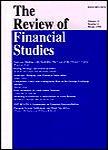-
作者:Hortacsu, Ali; Matvos, Gregor; Syverson, Chad; Venkataraman, Sriram
作者单位:University of Chicago; National Bureau of Economic Research; University of Chicago
摘要:Financial distress can disrupt a durable goods producer's provision of complementary goods and services such as warranties, spare parts and maintenance. This reduces consumers' demand for the core product, causing indirect costs of financial distress. We test this hypothesis in the market for used cars sold at wholesale auctions. An increase in a manufacturer's credit default swaps significantly decreases the prices of its cars at auction, especially cars with longer expected service lives. Ou...
-
作者:Obreja, Iulian
作者单位:University of Colorado System; University of Colorado Boulder
摘要:I propose a new dynamic model of the firm that links operating leverage to both value premium and book-leverage premium in stock returns. Value firms are low-productivity firms with either high operating leverage or high financial leverage. Firms with high operating leverage maintain low book leverage ratios. When operating leverage is economically significant, both value firms and low book-leverage firms can have high equity risk premiums. In particular, value premium becomes positive while b...
-
作者:Saretto, Alessio; Tookes, Heather E.
作者单位:University of Texas System; University of Texas Dallas; Yale University
摘要:Does the ability of suppliers of corporate debt capital to hedge risk through credit default swap (CDS) contracts impact firms' capital structures? We find that firms with traded CDS contracts on their debt are able to maintain higher leverage ratios and longer debt maturities. This is especially true during periods in which credit constraints become binding, as would be expected if the ability to hedge helps alleviate frictions on the supply side of credit markets.
-
作者:Vayanos, Dimitri; Woolley, Paul
作者单位:University of London; London School Economics & Political Science; National Bureau of Economic Research
摘要:We propose a theory of momentum and reversal based on flows between investment funds. Flows are triggered by changes in fund managers' efficiency, which investors either observe directly or infer from past performance. Momentum arises if flows exhibit inertia, and because rational prices underreact to expected future flows. Reversal arises because flows push prices away from fundamental values. Besides momentum and reversal, flows generate comovement, lead-lag effects, and amplification, with ...


